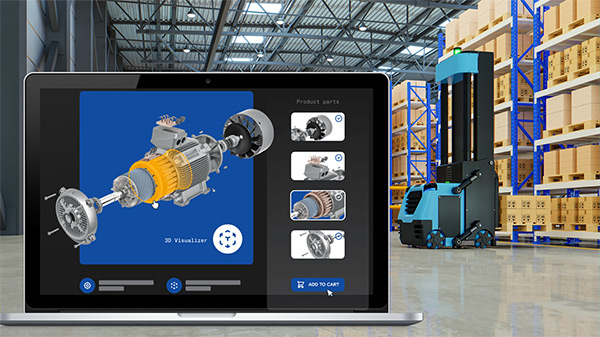CPQ is a must-have revenue engine for manufacturers. Here’s what organizations need to know about CPQ to achieve its promised benefits.

By Dominic Starr, director of U.S. sales, In Mind Cloud
Accelerating sales processes is one of the biggest challenges facing manufacturers today. As global competition intensifies, customer expectations evolve, and market volatility grows, manufacturers and sales solutions must transform to keep up. However, this requires digitization to the one area of business that, let’s face it, has not changed significantly for generations.
By digitizing sales, manufacturers can resolve current challenges and optimize the business to capture future opportunities better. As a result, this has risen to the top of Industry 4.0 priorities in 2022. Why? Because digital sales enablement takes full advantage of the investment of technological tools in the digital plant, which together creates the sales effectiveness that truly helps manufacturers grow their business and differentiate from their increasingly global competitors.
Many companies that use CPQ (configure, price, quote) software are still not seeing its purported benefits. However, this can be turned around if they recognize the key factors influencing their go-to-market digitization success.
Here are some reasons why manufacturers still fail to achieve the promised benefits of CPQ:
Markets are constantly evolving. Today, global product commoditization is threatening the market position of every single manufacturer. While some manufacturers moved to consolidations to stay relevant or capitalize, some have disappeared completely. As a result, customer relationships have been disrupted on both sides – for manufacturing suppliers and their buyers. For this reason, manufacturers must rethink their go-to-market strategies holistically and find new ways to gain an edge over their competitors.
One way to go about this is to recognize go-to-market as a top value driver and couple it with the opportunities modern technologies provide. Building new customer relationships while retaining existing ones and rethinking a manufacturing solution portfolio to match current market demands require a holistic approach that no isolated IT solution can support.
If your CPQ is not reaping the required rewards for you, it might not be suitable for providing your customers with an engaging end-to-end buying experience. B2B customers want a personalized and engaging shopping experience similar to the B2C experience they have been participating in for years. Manufacturers can achieve this outcome through personalization with the fast and flawless provision of a customized solution. The right CPQ can accomplish this for even a lot size of one.
Your prospects want to know that their requirements can be fulfilled accurately and quickly. They also want to experience your solution up close through 2D and 3D visualizations in an online sales portal. This “next-generation” B2B buying experience makes up a considerable chunk of their decision-making. Meeting the expectations of the B2B customer entails providing them with support at every touchpoint of their purchasing journey — from smart recommendations in their exploration phase to account-specific guided sales suggestions in their aftersales service, to automating of their decision and approval processes. The result? Manufacturers can raise the buying experience to an Amazon-like level.
The complexity of your manufacturing solutions and the size of your bill of materials can complicate and prolong manufacturing processes and buyers’ decision-making. The more BOM items, the more friction you create for your customers. The more complex your manufacturing solution – the more components, parts, materials, finishes, or other configurations offered — the more resources are needed to meet customer demand. Production accuracy, quality, and agility may also affect your processes when dealing with a significant number of configurations.
Implementing a fully integrated CPQ with real-time ERP data exchange can simplify these steps. With always up-to-date access to costs, materials, and stock levels, your sales teams can produce penny-precise quotes that match customer demand 100%. Thanks to global pricing, you can simulate margins and predict revenue instantly. And with the help of an integrated CRM, you can quickly determine how to prioritize your opportunities and sales activities accordingly.
Creating accurate sales proposals means you close deals faster. But accurate quoting also helps to reduce any unnecessary order or even production corrections after that – and this directly reflects in your bottom-line revenues that are the lifeblood strategic growth decisions.
With precise pricing and calculations that reflect real-time fluctuations in material costs or machine rates, you can generate profitable and error-free quotes. In addition, with an integrated ERP order creation following the CPQ process, you will reduce errors in the quoting, order, and production process, which leads to improved margins for the organization. What else? Oh, your customer will be much more satisfied, too.
Approvals and extensive internal collaboration between sales and engineering are often necessary for producing viable customized quotes. But these processes can prolong the entire sales cycle. In the worst-case scenario, extensive approval loops and delays can kill deals. Discreet manufacturers must be able to generate quotes and services with speed and accuracy to meet their customers’ expectations, and this isn’t easy to achieve using siloed IT solutions, such as a standard CPQ.
An industry-specialized and fully integrated CPQ with embedded collaboration and engineering tools can significantly reduce a manufacturer’s time-to-quote (TTQ) by up to 40%, positively impacting the manufacturer’s performance. This will help you keep up with your competitors or maintain an edge over them.
Introducing promotions and changing prices instantly is a game-changer for manufacturers. It helps you beat the competition, stay ahead of price fluctuations, and keep your business competitive and profitable. Introducing a fully integrated CPQ solution to your business can ensure that this process is accurate and high-quality. In addition, it can provide your sales teams, partners, and even your online sales portal with necessary pricing updates.
Likewise, agility and accuracy are the keys to winning the time-to-market challenge. In the digital economy, this can either make or break a business. New products will cost you more if your sales teams aren’t updated and selling them right away. But, on the other hand, you can potentially lose lucrative deals, innovation leadership, or even endanger your market leadership if left out of critical proposals.
Digital sales enablement ensures that your innovations are instantly in front of your sales team. Your teams will also be able to quickly update the latest proposals in minutes, while innovations can be immediately featured in your commerce storefront.
Taking advantage of up-sells and cross-sells can potentially increase your revenue by up to 30%. Therefore, it would be a waste to overlook these opportunities during the sales process.
The key to successful upsells is to recognize these opportunities quickly. A highly functional CPQ can readily suggest these recommendations and speed up the entire RFQ process. In addition, a successful upsell leads to better outcomes for the customer, higher customer satisfaction, and larger deal margins. In your commerce system, you can also offer additional products that match the customer’s installed base or suggest after-sales services directly in your customers’ shopping cart.
In manufacturing, a smooth supply chain is paramount. Disruptions can lead to losses for the manufacturer or even the customer. In today’s rattled economy, supply chain disruptions are the new norm. That makes supply chain resilience a significant goal for manufacturers across the globe.
A digitized sales process can help manufacturers accurately forecast demand–even for the smallest part in a bill of materials (BOM)—and track spending down to the penny. Digital sales also help manufacturers make crucial business decisions and optimize production and cost planning.
A lack of experienced people in the correct positions can adversely affect your business. For example, if manufacturers do not have enough engineers, they would not be able to accommodate their customers’ needs. Similarly, if they do not have experienced sales staff, they will not be able to sell and communicate with customers effectively.
With smart automation and production and engineering knowledge digitization capabilities, your sales teams can instantly generate quotes for even the most complex manufacturing solutions. Onboarding new team members or distribution partners will be seamless, and you can free up highly knowledgeable sales engineers to create custom solutions. In contrast, your sales staff can focus on generating additional value for your customers.
Another significant factor in this equation is the introduction of self-service options for your B2B customers. As prospects and customers are self-serving their needs in a smart and fully automated online portal, engineering and sales talents are free to do what they are best at — helping you become the top manufacturer in your industry.
Strategizing on your go-to-market from a holistic point of view and with a high focus on customer needs can help your organization eliminate challenges facing manufacturers today.
While global competition, customer expectations, and market volatility continue to influence discrete manufacturing, your sales solutions must continue to evolve beyond the challenges you are experiencing. This is how a digital sales enablement platform can help your business grow despite the economic circumstances.

Dominic Starr is a key member of the growing North America sales team at In Mind Cloud, serving as its director of sales. He is focused on driving customer growth originating in the US, Canada and Mexico. Most recently, Dominic served for five years as vice president of North America for sales-i, Inc, a UK-based SaaS platform for distribution and manufacturing sales teams. He was responsible for triple digit sales and headcount growth of the U.S. office team consisting of sales, customer success, training, project management and managed services consulting. Prior to sales-i, Dominic spent 21 years in telecommunications, originally in the start-up Nextel Communications, Inc., and later Sprint after the $39B merger in 2004. At both Nextel and Sprint, he served in a variety of sales and sales leadership roles including enterprise sales, sales operations, solutions consulting and sales engineering.
Scott Ellyson, CEO of East West Manufacturing, brings decades of global manufacturing and supply chain leadership to the conversation. In this episode, he shares practical insights on scaling operations, navigating complexity, and building resilient manufacturing networks in an increasingly connected world.